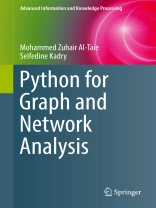This research monograph provides the means to learn the theory and practice of graph and network analysis using the Python programming language. The social network analysis techniques, included, will help readers to efficiently analyze social data from Twitter, Facebook, Live Journal, Git Hub and many others at three levels of depth: ego, group, and community. They will be able to analyse militant and revolutionary networks and candidate networks during elections. For instance, they will learn how the Ebola virus spread through communities.
Practically, the book is suitable for courses on social network analysis in all disciplines that use social methodology. In the study of social networks, social network analysis makes an interesting interdisciplinary research area, where computer scientists and sociologists bring their competence to a level that will enable them to meet the challenges of this fast-developing field. Computer scientists have the knowledge to parse andprocess data while sociologists have the experience that is required for efficient data editing and interpretation. Social network analysis has successfully been applied in different fields such as health, cyber security, business, animal social networks, information retrieval, and communications.
Cuprins
Theoretical Concepts of Network Analysis.- Network Basics.- Graph Theory.- Social Networks.- Node-Level Analysis.- Group-Level Analysis.- Network-Level Analysis.- Information Diffusion in Social Networks.- Appendix A: Python Tutorial.- Appendix B: Network X Tutorial












